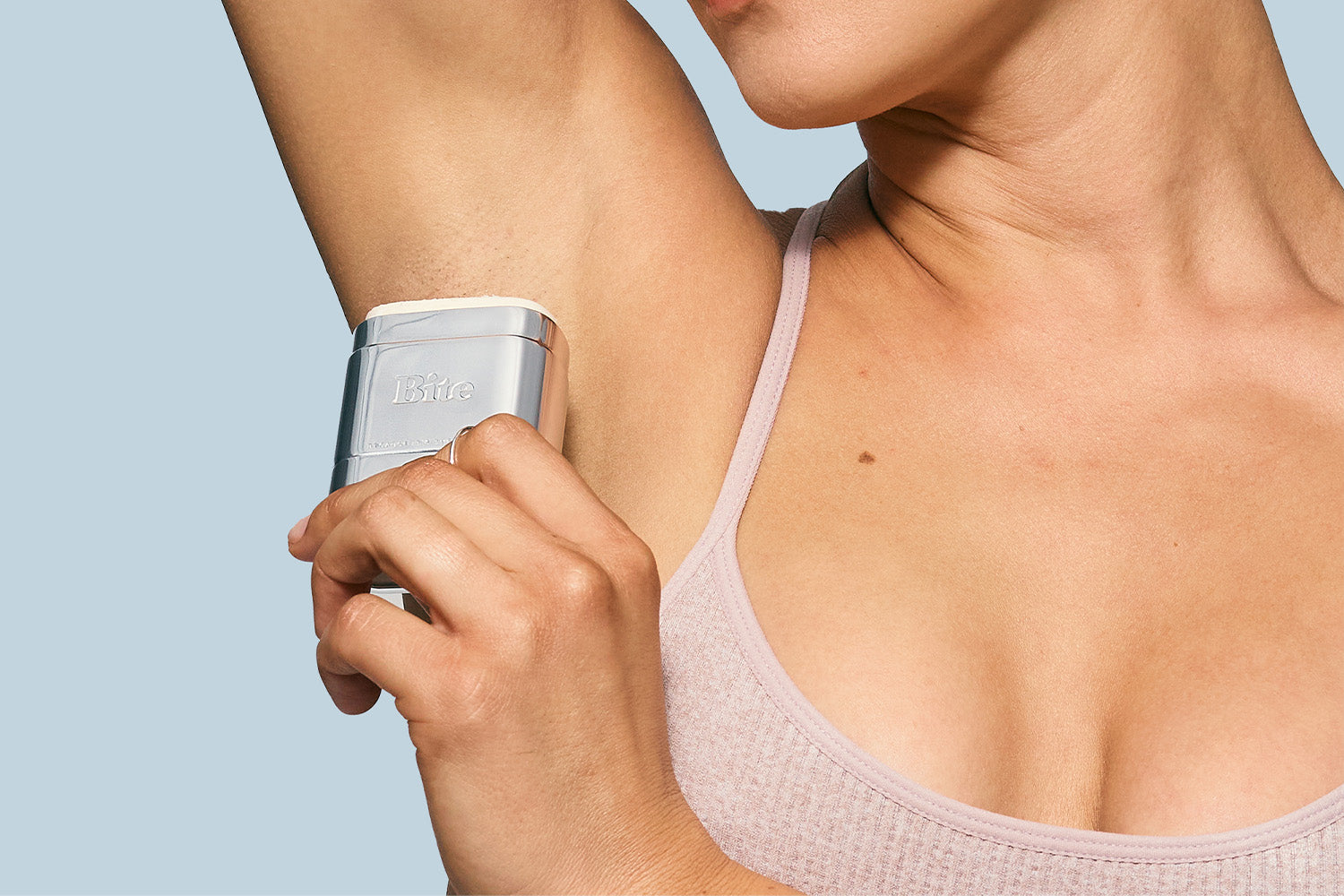Everything You Need To Know About Aluminum Free Deodorant
When you think about aluminum, you might be thinking about products like aluminum foil and aluminum cans — not about the antiperspirant deodorant that you apply every day during your morning routine for odor protection.
We all have certain antiperspirant or deodorant sticks that we swear by, but most of these deodorants likely contain aluminum, and this ingredient might be doing us more harm than we realize.
Fortunately, deodorant made without aluminum does exist — and it can be just as effective. Keep reading to learn about the risks of aluminum deodorant and the benefits of switching to aluminum free deodorant.
Why Is Aluminum Used in Deodorant?
Let’s face it — unnecessary perspiration is irritating and bothersome, especially when it is coming from your underarms.
Aluminum is the main ingredient in antiperspirant deodorant that helps keep your armpit sweat at bay, but it is also a culprit for many health risks.
Aluminum is used so widely in antiperspirant deodorant because it acts as a plug to stop sweat from reaching the surface of your skin temporarily. However, some research has found that aluminum may have estrogen-like effects on the body.
What Are the Risks of Aluminum in Deodorant?
Because aluminum disrupts the natural function of sweat glands and affects the hormones, some risks are associated with using this kind of deodorant, both short and long-term.
Precautions
Some studies show that prolonged usage of aluminum in deodorant may cause aluminum to build up in breast tissue and potentially increase the risks for certain long-term health conditions. This is a main reason why you might want to proceed with caution.
Many deodorants contain certain chemicals that have been linked to health concerns — and we aren’t only talking about aluminum.
Triclosan is a chemical that kills bacteria that causes odor. Though an effective ingredient, triclosan disrupts hormones because it interferes with hormone signaling.
Phthalates are ingredients found in deodorants and other products like shampoo and help extend the life of fragrance in your products. Though shampoos and deodorants with fragrances smell nice and refreshing, the phthalates in these products may act as hormone disruptors.
Parabens are yet another potential hormone disruptor because they can mimic estrogen. Parabens are used as preservatives and are found in many products, from shampoo to lotion.
Side Effects
Because aluminum and other harmful ingredients are found in so many personal care products, using these products in combination can cause issues for your endocrine system responsible for hormone signaling and communication.
Regulated hormone levels are super important because your hormones help regulate all of your body’s functions. You should feel safe and confident about your personal care products, and it can be difficult to do so when so many products contain aluminum and other harmful ingredients.
Long-Term Use
The risks of long-term use of aluminum antiperspirant deodorant are more worrisome for those with kidney issues since people with these issues cannot properly filter aluminum out through their kidneys.
Regardless of whether you have kidney or other health issues, using aluminum antiperspirant deodorant risks disrupting your natural bodily processes.
Sweating prevents your body from overheating, and when you block your sweat glands with aluminum-based antiperspirants, it interferes with this normal function. Not to mention that conventional antiperspirants and deodorants are cased in wasteful plastic.
Fortunately, there are effective alternatives that are better for your body — and the planet.
At Bite, we firmly believe that caring for your body and the planet should work together. That is why we create sustainable, clean personal care products like refillable deodorant to give you peace of mind about your personal care routine.
Our deodorant is free of aluminum, parabens, and phthalates, among other harmful ingredients, instead featuring coconut oil, shea butter, and zinc oxide to keep you feeling fresh.
What Happens in Your Body When You Stop Using Aluminum Deodorant?
If you have chosen to stop using aluminum deodorant, you can expect some mildly unpleasant changes at first. However, your body will adjust as it gets used to aluminum-free deodorant, and these changes will eventually subside.
If you are used to not sweating when using aluminum deodorant, the sweating you experience while switching to more natural deodorant may be bothersome at first.
You may experience more body odor than normal when you first stop using aluminum-based deodorant. This is because of the increase in perspiration. Using aluminum-free natural deodorant will help keep you smelling fresh.
Over time, your body will readjust to its natural process of sweating, and the excessive sweating you experience at the beginning of the transition will slow.
What Is Aluminum-Free Deodorant?
Aluminum-free deodorant is, well, deodorant made without aluminum.
There is a key difference between deodorants and antiperspirants, though. Deodorants target the odor-causing bacteria, while antiperspirants prevent you from sweating in the first place. Even further, some products work as both deodorants and antiperspirants.
Some antiperspirants are made without aluminum, instead incorporating alternatives like corn starch, arrowroot powder, talc, and baking soda to absorb moisture.
Does Aluminum-Free Deodorant Still Work?
Aluminum-free deodorant can be just as effective, but you will experience a period of time where your body is acclimating itself to the absence of your usual antiperspirant.
At Bite, we know that taking care of your body and the environment does not mean that you have to compromise on quality. That is why we have created a sustainable, clean, refillable deodorant that is both aluminum and plastic-free.
We include essential oils like eucalyptus, sandalwood, and tea tree oil as opposed to artificial fragrances — and with scents like Neroli, Rose Vert, and Santal, you can still feel fresh and clean without the aluminum.
With a Bite subscription, our deodorant is sent to you every four months so that you never have to worry about running out!
Is Aluminum-Free Deodorant an Antiperspirant?
Because aluminum is used as an antiperspirant, many deodorants that are aluminum-free are not antiperspirants.
However, natural alternatives like tapioca starch can act as antiperspirants in some deodorants like ours at Bite.
What Kinds of Ingredients Are Used for Aluminum-Free Deodorants?
There are plenty of natural alternatives to harsh chemicals that are used to make aluminum-free deodorant. Below are some ingredients that we use at Bite to give you a high-quality, clean deodorant that will leave your skin feeling smooth and clean without any sticky residue.
We know that many people have sensitive skin, and many personal care products can cause irritation due to abrasive ingredients or chemicals. Our natural deodorant is formulated without skin irritants like baking soda, instead using natural ingredients that keep your skin healthy and happy.
Coconut Oil
Coconut oil has antibacterial properties, so we include this oil in our formula to create a protective barrier on your skin to prevent the growth of bacteria caused by sweating.
Shea Butter
Shea butter is a moisturizer that also contains vitamin E. Our deodorant has shea butter to keep your skin moisturized and soft.
Castor Oil
Castor oil is another moisturizing agent that we use in our formula to keep your skin calm and smooth.
Tapioca Starch
The star of our natural deodorant, tapioca starch, acts as a mild antiperspirant that keeps your underarms dry without completely stopping the natural bodily process of sweating.
Vitamin E
Vitamin E prevents your skin from losing natural moisture and keeps your skin soft. We use vitamin E in our formula to keep your skin smooth and healthy.
How Should Aluminum-Free Deodorant Be Used?
We all have different lifestyles, needs, and personal care routines. Aluminum-free deodorant can be used like any other kind of deodorant and in the way that works best for you.
Some people use deodorant more than others, meaning that you may run out of your deodorant more frequently than others.
We at Bite are dedicated to making sure that you have all the products you need to have a successful personal care routine. When you purchase our deodorant, we equip you with two deodorant refills and a refillable case with a lifetime warranty.
With a subscription, we also send additional refills every four months so that you never have to worry about running out.
We have the first ever, 100% plastic-free deodorant with compostable refills, clean ingredients, and natural tools to stop odor and the 15 million pounds of deodorant packaging that pollute oceans and overflow landfills every single year. That is a massive win for both your health and the environment.
Other aluminum-free deodorants still contain harmful ingredients like parabens and phthalates, which discourages those wanting to make the deodorant switch.
At Bite, our refillable deodorant contains no harmful parabens or phthalates. You can feel confident in making the switch to aluminum-free deodorant with our clean and natural formula.
The Bottom Line
With all of the toxins and harmful chemicals that are in so many personal care products, it is hard to make changes to your routine that are good to you and the earth but are still effective.
Switching from aluminum deodorant to aluminum-free deodorant that actually works can be a tough task, but we are here to make this transition easy for you!
Sources:
Antiperspirants | National Kidney Foundation
Is Deodorant Harmful for Your Health? | Penn Medicine
Antiperspirants/Deodorants and Breast Cancer | Cancer.gov
Deodorant & Toxic Ingredients of Concern | Made Safe
What is the Endocrine System? | US EPA
Is sweating good for you? | Food & Health


